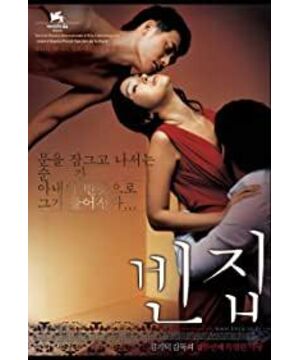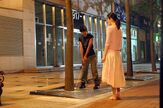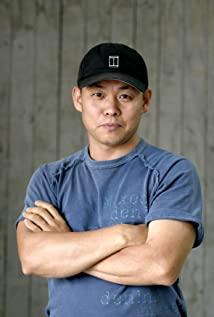I think this film is about the impossibility of being completely present. The "presence" mentioned here refers to the meaning of immediacy and on-siteness, and the "absence" that will be mentioned is also its corresponding meaning.
From the beginning of the film, the male protagonist is parasitic on the absence of others: only when the owner is not at home can he eat, rest, and perch. After the heroine joined, this state has not changed. Their presence is proof of the homeowner's absence; after the homeowner is present (going home), the hero and heroine must be absent (leaving).
In the scenes of the heroine and her husband, even if both parties are physically present, they are still absent. The "meaning" I put forward here is not just the meaning of "referring to", but a need of human beings, which is closer to the usual literal meaning. "One" is meaningless, because "one" is a single thing; from "two", it has meaning, because there is a connection between the monomers, and it is meaningful to have a connection. As soon as they get close, they begin to use language a lot. Words seek meaning, so the presence of words means absence. The first communication between the two parties was the husband's phone message, which was physically absent. The face-to-face conversation between the two parties is the absence of meaning, because there is no connection between them - the connection of achievement meaning is not one-way.
Once the words are received, if there is no connection, there is no meaning, and violence is born. Because it means that the two sides are not equal in emotion or idea, and discourse, as a form of externalization, is irrevocable after it is received, so it evolves into a kind of violence, or implies a tendency to violence. Every time there is dialogue in the film, it is almost always accompanied by violence: verbal and physical. In the same way, it is the golf violence method that is constantly emphasized in the film. Golf itself is a sport of constant pursuit of presence and absence. Golf counts the number of strokes, and the fewer the strokes, the higher the score; the benchmark for calculating the number of strokes is the timing when the ball hits the hole. As long as the ball misses the hole, the strokes continue to accumulate. In other words, you can only be absent (continuously changing your position following the position of the ball) until you are present (the ball hits the hole). In the film, all golf balls have no hole as the target, which means that the possibility of its presence is deprived, so, like words, once received, if they have no meaning, then it is violence. The male protagonist tied the ball, but the female protagonist reminded him and stopped him; in the end, he still hurt someone, which means that whether the violence occurs or not is not under the control of the perpetrator.
In the second half of the film, the male protagonist was attacked by prison guards for his absence again and again in prison, emphasizing his presence, but he became more and more frustrated, and kept improving his skills in absence. The male protagonist's subjective lens and handheld photography are widely used in the scenes of the male protagonist, which fully demonstrates the absence of the male protagonist. This is also a possibility offered by the film to refute total presence. People other than the hero and heroine have been constantly emphasizing the presence and chasing the presence (telephone calls, photos, witnesses, investigations, detentions, beatings), but only the silent heroines and heroines can truly establish a warm relationship between people. made meaning. When they intensified their pursuit of the presence and further obliterated the hero's survival by means of absence, the hero cleverly used the natural gap to avoid everyone except the heroine, and separated the presence and absence from another dimension, fully Demonstrates the incompleteness of presence. This is a way of giving in, showing a very tense posture, and completing the attack on the presence in an oriental way.
See also The Forge and Broken Arrow. "The Furnace" ended with a fiasco on behalf of the deaf-mute children. The side who lost the ability to speak lost the ability to pursue meaning and reproduce the scene. In this context, the film tacitly acknowledges that words can reach meaning. And "Broken Arrow" ended with Professor Jin, who kept citing the law, lost to the reticent presiding judge. Even if he had mastered the words of the media, he still could not reproduce the scene. It shows that the law does not always reach justice and discourse. Does not always reach meaning. Now seeing "Empty Room", what the film tells us is that meaning can be achieved without words.
View more about 3-Iron reviews









